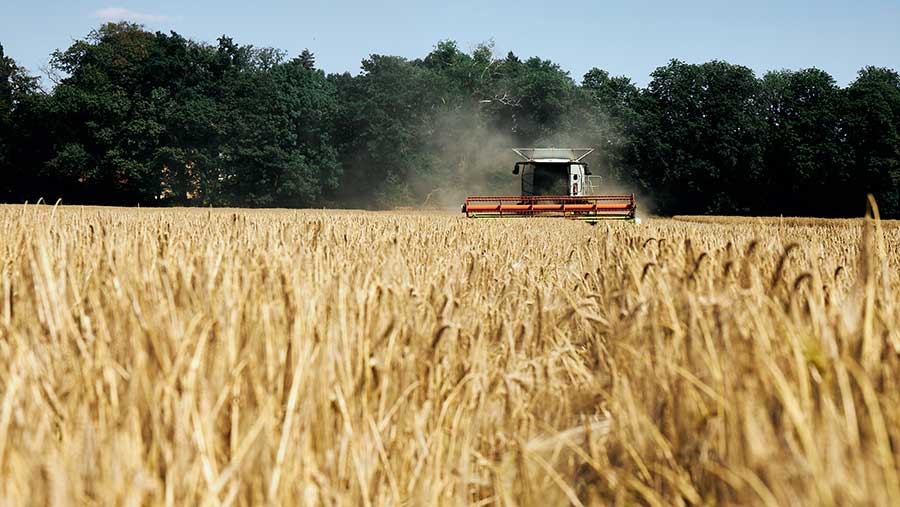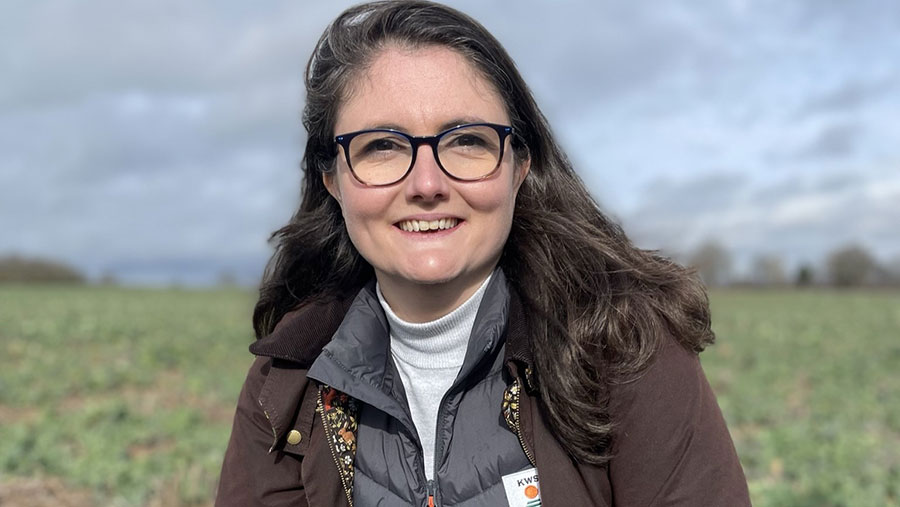Advertiser content
KWS Winter Barley – leading from the front
 © KWS UK Ltd
© KWS UK Ltd KWS Tardis has a 40% market share in the UK winter barley market giving a great foundation for an exciting KWS development programme for the crop including the introduction of new hybrids.
Winter barley remains an important part of many UK rotations with many growers valuing the diversity it adds and others pointing out it can be a more profitable option than second wheat, says KWS UK technical manager for conventional crops Olivia Bacon.

Olivia Bacon © KWS UK Ltd
“At the top of the current winter barley options lies KWS Tardis with a proven track record of UK-wide results making it an attractive proposition for growers, regardless of location,” she says.
“It’s one of the UK’s highest yielding 2-row winter feed barleys, being especially strong in the east with 104% of controls.
“With super stiff straw, KWS Tardis performs well on heavy land where it delivers its best yields at 106% controls plus its excellent disease package, including 6s for Rhynchosporium and blotch resistances, underpins an untreated yield of 85%.
“While KWS Tardis’ yields, stem stiffness, grain quality, performance across the rotation and a good disease package make it a difficult act to follow, we have several exciting new options waiting in the wings.
“KWS Heraclis is a great candidate-listed high-yielding barley with the same good combination of untreated yield, field performance and grain quality with a secure field package thanks to its super stiff straw to minimise lodging.
“There’s also easy-to-grow KWS Valencis promising the same high yields and the 2-row advantage of bold, bright grain with good specific weight.”
“KWS Tardis is one of the UK’s highest yielding 2-row winter feed barleys with a performance that rivals many of the 6-row hybrids.”
New hybrid barley launched
KWS has announced it will be launching its first ever hybrid barley into the UK market later this year with a strong pipeline of varieties behind it underlining the company’s commitment to developing a significant position in the sector in coming years.
Barley is one of the most important cereal crops worldwide and KWS has a long history of successfully breeding exceptional varieties, says KWS UK hybrid crop product manager Kate Cobbold.

Kate Cobbold © KWS UK Ltd
“We are the market leader in conventional barley in the UK and France, for example, and introducing hybrid barley now adds to that position by allowing us to offer another solution to growers.”
But the new range of hybrid barleys being launched under #NextLevel, does not replace the company’s highly successful conventional varieties, such as the current UK market leader KWS Tardis, she emphasises.
“There is a place for both conventional and hybrid barley varieties on farm. Depending on the end market and local growing conditions, farmers now have options for finding the most appropriate barley solution and that is the real benefit of the KWS position.
“At the moment, 450,000ha of winter barley is grown in the UK each year of which roughly 25% is hybrid barley so we see huge opportunities in the future with the crop bringing many benefits to growers.”
Exciting future
The variety Inys is the first of the new hybrid barley varieties to be launched, she explains.
“Inys seems to have a definite yield advantage over the leading hybrids currently available in the UK with good yield stability, plus we’re seeing thicker plant stands and deeper rooting, which is exactly what we were hoping to see.
“There are indications that Inys also has a much more vigorous growing habit in the early stages of development with up to 40% greater ground cover being seen in some instances.”
According to Sandra Dunckel, KWS’ head of breeding barley, special crops and organics, the UK will be the first of the company’s global markets to introduce hybrid barley.
“Many people have put in a lot of hard work to get us to this point, with the hybrid barley breeding programme taking us all across Europe and strengthening the bonds between the different barley breeding teams within KWS stations.
“Furthermore, we have initiated ongoing trials across multiple countries with the first KWS hybrids entering official trials in autumn 2022, which represents a major, and very exciting, milestone for us.”
KWS spring barley jumps forward
Development of spring barley also remains a key future objective with a pan-European initiative focusing on improved yield potential and stability, disease resistance quality characteristics, says KWS spring barley breeder Dr. Henry Barber.
“We are committed to bringing a range of new generation spring barleys to the UK market in the next few years which will offer growers and the trade significant productivity, environmental and financial benefits.”
KWS Enduris is a good example of what the initiative can offer, he says.
“It’s a true farmer-friendly variety and an exciting new addition to the AHDB Candidate List for spring barley in 2024, being currently under evaluation by the MBC to determine its full potential in both the whisky and beer sectors.
“An easy to grow variety with very stiff straw and excellent standing and earliness, KWS Enduris’ yield is significantly ahead of its rivals in terms of UK average, with excellent disease resistance putting it top of the class for untreated yield, too.
“Susceptibility to brackling is also at the level lowest achieved by any variety on the current Recommended List for spring barley, plus it’s got excellent specific weight of 68.3 kg/hl.
“Like KWS Curtis, it also has a very high spirit yield and excellent hot water extract.”
Provided by
KWS is one of the world's leading plant breeding companies combining 165 years of heritage with leading edge technology and a commitment to develop and deliver varieties with the best yields, disease resistance, physical traits and resistance to abiotic stress.
